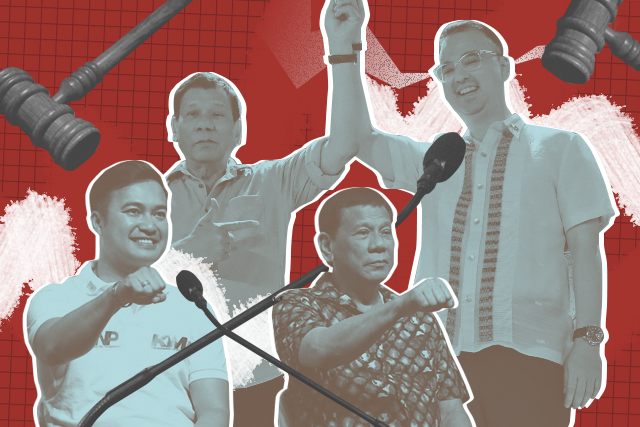
(Updated at 12:43 p.m. on July 2) They share a similar name and a similar bid to become the leader of the House of Representatives.
On TV, Rep. Alan Peter Cayetano (Taguig) accused Rep. Lord Allan Velasco (Marinduque) on Monday morning, July 1 of lying about their supposed term-sharing as House speaker, a deal which President Rodrigo Duterte earlier confirmed.
While there’s no new House speaker yet, the scenario recalls to the rivalry between then Rep. Pantaleon Alvarez (Davao del Norte) and Rep. Gloria Macapagal Arroyo (Pampanga) last year.
The rivalry reached its height at a congressional session before President Rodrigo Duterte delivered his third State of the Nation Address (SONA). Then-House Speaker Alvarez lost his position to Arroyo after a surprise vote.
Duterte later admitted that his daughter Davao City Mayor Sara Duterte had a hand in the confusion.
Earlier this year, Alvarez claimed that the sought-after position can be secured through vote-buying. His colleagues, particularly Velasco, denied that the same situation is happening in the lower chamber of Congress.
Who is the next speaker?
Before Arroyo’s term ended, Duterte told her that she could choose her replacement to prevent a power play like in the previous year.
Arroyo, however, reportedly did not publicly mention any names.
Last week, Sen. Manny Pacquiao, a member of ruling party PDP-Laban, announced that the party finally decided to endorse Velasco to lead the chamber. That left Cayetano in a quandary.
Cayetano said in an interview that it was Velasco’s camp who initially proposed to divide the terms into two—with Cayetano sitting for the first 15 months while Velasco will assume the position for the remaining 21 months.
Velasco, however, suddenly rejected this “term-sharing” agreement, according to Cayetano, as it would divide the lower chamber of the Congress.
“Sinabi ni Lord Velasco na walan naman ganoong usapan. So okay lang naman sa akin na magsinungaling siya because politicians lie,” the Congressman-elect of Taguig said to ANC’s “Headstart.”
Cayetano said Velasco should then apologize to Duterte.
“I was watching him here but to call the president a liar by saying there is no such agreement, I will not take that sitting down. Congressman Velasco owes the president an apology and he owes the people na mas maging honest siya,” he said.
Moreover, he also concurred with Alvarez’s claim of bribery among congressmen for the speakership.
“The president says anti-corruption. E paano magiging anti-corruption ang Kongreso, umpisa pa lang, vote-buying na ang issue?” he said.
It was the president’s idea
Cayetano added that the division of terms was offered to them during Duterte’s recent visit in Japan.
The president supposedly said: “Kung ako ang masusunod, magte-term sharing na lang kayo kasi pare-pareho kayong may ino-offer, pare-pareho ko kayong kaibigan.”
As of writing, there was no official statement from the congressman-elect of Marinduque about Cayetano’s claims.
The odds, however, are not lining up to Cayetano’s favor.
Besides PDP-Laban, other major political blocs are backing Velasco’s bid, namely the nationalist People’s Coalition and the Northern Luzon Alliance.
Why would anyone want to become speaker?
The speaker is the fourth highest official in Philippine government and the highest ranking member of the lower chamber of Congress.
A speaker is essentially an infuential personality who has broad powers as political and administrative leader. Based on Section 15 of the Rules of the House, among such powers are:
— To set legislative agenda for regular sessions and procedures for swift approval of the measures on the lineup. A speaker closely allied with the president consequently is expected to more eagerly push for the adminstration’s choice policies.
— To supervise congressional committees, calls for and sits in meetings, aligns them with legislative agenda and sets targets for performance.
— To conduct reguar caucus of members of the House to facilitate dialogue and consensus.
— To decide on all questions of order, subject to appeal by any member
— To sign all acts, resolutions, memorials, writs, warrants and subpoenas issued by or upon order of the House
— To appoint, suspend, dismisse or discipline House personnel.
A speaker shall be elected by a majority vote of all the members of the House of Representatives at the start of each Congress.
Former speakers of the House include Jose de Venecia Jr. under the Ramos and Arroyo administrations, Manuel Villar under the Estrada administration, Arnulfo Fuentebella under the Estrada and Arroyo administrations and Feliciano Belmonte Jr. under the Aquino administration. —Artwork by Uela Altar-Badayos









